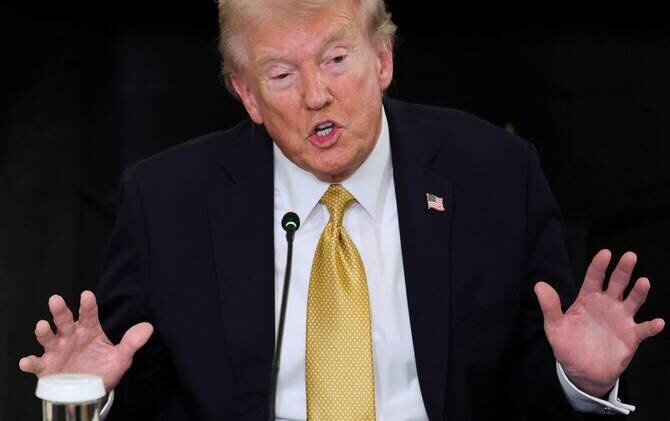
Trump's Approach to Drug Cartels: No Declaration of War, Military Strikes Continue
US President Donald Trump has announced that his administration will brief Congress on operations against drug cartels, emphasizing a hands-on approach without requiring a formal declaration of war.
US President Donald Trump revealed plans to address the US Congress regarding ongoing efforts to combat drug cartels.
He clarified that instead of seeking a formal declaration of war, military operations targeting drug traffickers would continue, with an emphasis on lethal force.
Trump's statements came as the US military strengthens its presence in the Caribbean, deploying guided-missile destroyers, F-35 fighter jets, and nuclear submarines alongside thousands of troops.
These moves are part of a broader strategy to counter drug trafficking activities that have been increasing concern both domestically and internationally.
Since early September, the US has conducted multiple strikes against suspected drug vessels in the Caribbean and Pacific Ocean, resulting in the deaths of nearly 40 individuals.
The Pentagon, while providing limited details on these operations, has acknowledged some strikes occurring near Venezuelan waters.
Trump signaled that the military's efforts would expand to include land-based operations, aiming to combat drug trafficking through various means.
This announcement aligns with recent comments indicating an intention to target drug cartels more aggressively.
In response to these threats, Venezuelan President Nicolas Maduro issued a warning to the US, stating that any intervention in Venezuela would trigger widespread protests and resistance from the population.
Maduro emphasized that millions of citizens would be prepared to defend their country against foreign interference.
A recent incident highlighted by Reuters involved two alleged drug traffickers surviving a US military strike in the Caribbean.
These individuals were rescued and later repatriated to Colombia and Ecuador, raising questions about the efficacy and protocols surrounding these operations.
US Defense Secretary Pete Hegseth defended the decision to repatriate survivors, drawing parallels to battlefield procedures during conflicts in Iraq and Afghanistan.
The escalating tensions and military involvement underscore a complex geopolitical situation, where national security concerns meet the challenges of drug trafficking on a global scale.
He clarified that instead of seeking a formal declaration of war, military operations targeting drug traffickers would continue, with an emphasis on lethal force.
Trump's statements came as the US military strengthens its presence in the Caribbean, deploying guided-missile destroyers, F-35 fighter jets, and nuclear submarines alongside thousands of troops.
These moves are part of a broader strategy to counter drug trafficking activities that have been increasing concern both domestically and internationally.
Since early September, the US has conducted multiple strikes against suspected drug vessels in the Caribbean and Pacific Ocean, resulting in the deaths of nearly 40 individuals.
The Pentagon, while providing limited details on these operations, has acknowledged some strikes occurring near Venezuelan waters.
Trump signaled that the military's efforts would expand to include land-based operations, aiming to combat drug trafficking through various means.
This announcement aligns with recent comments indicating an intention to target drug cartels more aggressively.
In response to these threats, Venezuelan President Nicolas Maduro issued a warning to the US, stating that any intervention in Venezuela would trigger widespread protests and resistance from the population.
Maduro emphasized that millions of citizens would be prepared to defend their country against foreign interference.
A recent incident highlighted by Reuters involved two alleged drug traffickers surviving a US military strike in the Caribbean.
These individuals were rescued and later repatriated to Colombia and Ecuador, raising questions about the efficacy and protocols surrounding these operations.
US Defense Secretary Pete Hegseth defended the decision to repatriate survivors, drawing parallels to battlefield procedures during conflicts in Iraq and Afghanistan.
The escalating tensions and military involvement underscore a complex geopolitical situation, where national security concerns meet the challenges of drug trafficking on a global scale.